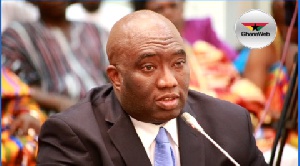The findings of the Ghartey committee tasked to investigate the bribery allegations made against the leadership of the Appointments Committee of Parliament by Bawku Central MP Mahama Ayariga are not enough to exonerate those allegedly involved in the bribery, Jamal Konneh, director of communications of the National Democratic Congress (NDC) in the Eastern Region, has said.
The Committee has found Mr Ayariga to have been in contempt of parliament.
In its 56-page report, the Committee said it “came to the firm conclusion that Mr Mahama Ayariga is in contempt of parliament on the strength of Article 122 of the 1992 Constitution, section 32 of the Parliament Act, 1965 (Act 300) and Orders 28 and 30 (2) of the Standing Orders of Parliament”.
The Committee said it “came to this conclusion because Mr Mahama Ayariga failed to prove that indeed Hon Boakye Agyarko [Energy Minister] gave money to Hon Joseph Osei-Owusu [Chairman of the Appointments Committee] to be distributed to the members of the Appointments Committee with a view to bribe them”, as alleged by Mr Ayariga in an interview he granted Radio Gold.
The Committee has, thus, recommended that having established a case of contempt against Mr Ayariga as well as having examined the sanctions regime available, recommends to the house the following:
1.That the Hon member for Bawku Central Mr Mahama Ayariga, be reprimanded by the Rt Hon Speaker in accordance with section 35 of the Parliament Act, 1965 (300)
2.That Mr Mahama Ayariga render an unqualified apology to the House, purging himself of contempt.
The 5-member ad hoc Committee chaired by Essikado Ketan MP Joe Ghartey said it “took notice of the fact that the Hon Mahama Ayariga is not known to have engaged in acts that tend to disrupt the smooth proceedings of parliament.
Neither does he have a penchant nor reputation of engaging in activities which can bring the image and dignity of parliament into disrepute. Accordingly we view the recommendation relating to the sanctions adequate in the circumstances.”
But in a statement reacting to the report, Mr Konneh said: “The recent allegation of corruption against the Chairman of the Parliamentary Vetting Committee has further deepened the mistrust the citizenry has in parliament as an institution.
However, the recommendations of the committee that was set up by the Speaker of Parliament to investigate the issues have vindicated the public's view on the report even before it came out.
“The question most Ghanaians are asking is whether parliament is not breeding timidity among its members? I am not a doctor, but I'm told it’s ethically wrong for a medical doctor to treat himself or herself.
So why did parliament decide to investigate itself? I am a Ghanaian and I'm not happy about the way and manner the committee concluded their work on the issue.
I do not think this committee's report exonerates parliament from this corruption allegation. It is rather deepening the mistrust Ghanaians have in them.”
General News of Friday, 31 March 2017
Source: classfmonline.com













